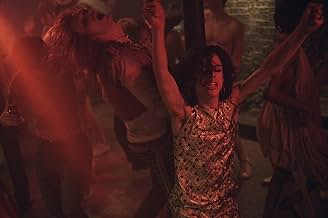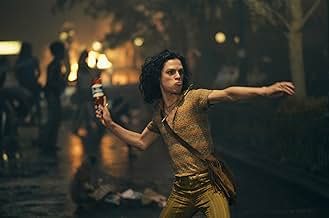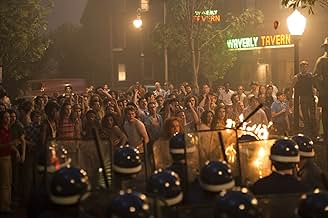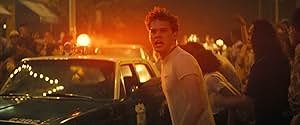IMDb-BEWERTUNG
5,4/10
4620
IHRE BEWERTUNG
Das politische Erwachen und Erwachsenwerden eines jungen Mannes in den Tagen und Wochen vor den Stonewall-Unruhen.Das politische Erwachen und Erwachsenwerden eines jungen Mannes in den Tagen und Wochen vor den Stonewall-Unruhen.Das politische Erwachen und Erwachsenwerden eines jungen Mannes in den Tagen und Wochen vor den Stonewall-Unruhen.
- Auszeichnungen
- 4 Nominierungen insgesamt
Vlad Alexis
- Cong
- (as Vladimir Alexis)
Empfohlene Bewertungen
This movie is a complete lie all the main characters are white even doh the people that started the movement in reality were black
Greetings again from the darkness. Dramatized versions of real life events are always a bit tricky, and hindsight often proves it's best left to the documentary format. However, sometimes, a dramatized version helps us more easily relate to, and empathize with, those who were involved. That seems to be the approach taken by director Roland Emmerich in his re-telling of events so important to him and the LGBT movement
the Stonewall Riots of 1969.
The Stonewall Riots of June 1969 are often cited as the beginning of the Gay Liberation movement. Of course, there had been many previous clashes between gays and police, as discrimination was so extreme that these folks were labeled as mentally ill, and it was actually unlawful for gays to be hired for many jobs. On the streets of many big cities there existed a melting pot of minorities and the LGBT community. Many were young and homeless, and did whatever necessary to survive. So how best to tell this story? Director Emmerich and writer Jon Robin Baitz put blonde, white, Midwestern, pretty boy Danny (Jeremy Irvine, War Horse) front and center. How insulting to those involved.
To his credit, Emmerich does cast actors of various races to many roles, and he does seem to treat this as a sincere tribute or homage to those street kids who finally pushed back. Unfortunately, it's these characters that seem to be the drag on the story. Despite such names as Queen Cong, Little Orphan Annie, Quiet Paul, and the inclusion of real life activists as Marsha P Johnson (Otoja Abit), Bob Kohler (Patrick Garrow) and other key players like Ed Murphy (Ron Perlman) and Deputy Seymour Pine (Matt Craven) the film comes off more like a staged musical sans music. The closest thing to a real character is Ray, played with aplomb by Jonny Beauchamp ("Penny Dreadful").
Having the Columbia University-bound pretty white boy as the focus might make it easier for mainstream audiences to connect, but it skims over the real struggles going on at the time. We see Danny at home with his worried mother, observant little sister (Joey King), and macho football coach/father (David Gubitt). Everyone is uncomfortable over what is not being said, and the breaking point occurs when a tryst with the star quarterback becomes public knowledge. Just like that, Danny is booted from home (Indiana, not Kansas) and lands on the streets of New York. The comparisons to Dorothy (gay icon Judy Garland) and the Land of Oz are obvious, and repeated numerous times for those a bit slow on the take.
Christopher Street and the Stonewall Inn are the main settings. The mob involvement is noted, as is the desperation of the community, the use of flop houses, and the long-standing "quiet" demonstrations. Even the practice of gays trying to "fit in" to society – to prove they belong – by wearing suits and acting "normal" is addressed. The riots are reduced to a single evening in the movie, and of course, the pretty white boy gets to toss the first brick. As a 'roots of the movement' film, it's hard to believe this film won't create more anger and frustration than thanks and awareness. Fortunately, there are many exceptional books and yes, documentaries that provide a better perspective on the events that occurred more than 45 years ago. We do see the first Gay Liberation Parade held the following year in honor of the riots – a tradition that continues today. The closing credit sequence catches us up on the key activists, and even provides a startling statistic: 40% of today's homeless youth are LGBT.
The Stonewall Riots of June 1969 are often cited as the beginning of the Gay Liberation movement. Of course, there had been many previous clashes between gays and police, as discrimination was so extreme that these folks were labeled as mentally ill, and it was actually unlawful for gays to be hired for many jobs. On the streets of many big cities there existed a melting pot of minorities and the LGBT community. Many were young and homeless, and did whatever necessary to survive. So how best to tell this story? Director Emmerich and writer Jon Robin Baitz put blonde, white, Midwestern, pretty boy Danny (Jeremy Irvine, War Horse) front and center. How insulting to those involved.
To his credit, Emmerich does cast actors of various races to many roles, and he does seem to treat this as a sincere tribute or homage to those street kids who finally pushed back. Unfortunately, it's these characters that seem to be the drag on the story. Despite such names as Queen Cong, Little Orphan Annie, Quiet Paul, and the inclusion of real life activists as Marsha P Johnson (Otoja Abit), Bob Kohler (Patrick Garrow) and other key players like Ed Murphy (Ron Perlman) and Deputy Seymour Pine (Matt Craven) the film comes off more like a staged musical sans music. The closest thing to a real character is Ray, played with aplomb by Jonny Beauchamp ("Penny Dreadful").
Having the Columbia University-bound pretty white boy as the focus might make it easier for mainstream audiences to connect, but it skims over the real struggles going on at the time. We see Danny at home with his worried mother, observant little sister (Joey King), and macho football coach/father (David Gubitt). Everyone is uncomfortable over what is not being said, and the breaking point occurs when a tryst with the star quarterback becomes public knowledge. Just like that, Danny is booted from home (Indiana, not Kansas) and lands on the streets of New York. The comparisons to Dorothy (gay icon Judy Garland) and the Land of Oz are obvious, and repeated numerous times for those a bit slow on the take.
Christopher Street and the Stonewall Inn are the main settings. The mob involvement is noted, as is the desperation of the community, the use of flop houses, and the long-standing "quiet" demonstrations. Even the practice of gays trying to "fit in" to society – to prove they belong – by wearing suits and acting "normal" is addressed. The riots are reduced to a single evening in the movie, and of course, the pretty white boy gets to toss the first brick. As a 'roots of the movement' film, it's hard to believe this film won't create more anger and frustration than thanks and awareness. Fortunately, there are many exceptional books and yes, documentaries that provide a better perspective on the events that occurred more than 45 years ago. We do see the first Gay Liberation Parade held the following year in honor of the riots – a tradition that continues today. The closing credit sequence catches us up on the key activists, and even provides a startling statistic: 40% of today's homeless youth are LGBT.
There's so much wrong with this movie it's hard to know where to begin.
If you want to learn about Stonewall, there are plenty of documentaries out there that tell the story much more accurately than this does: this flick plays into the tired old cliches about how the riot started, but manages to whitewash the characters and distort events horribly. You'd be better off watching "The Death and Life of Marsha P. Johnson" for starters.
If you just want a well-acted, well-written period drama, there are countless other films with better acting, better character development and less cliched writing than this one. What's particularly offensive is the reliance once again on stereotypical caricatures of fat, ugly old lecherous queens, preying upon the purebred white-boy central character. Other characters (Ray being the prime example) are completely undeveloped and could have made things more interesting. And lastly, you'd be offended if you watch this after seeing the 1995 "Stonewall" to see how much Roland Emmerich simply rips off from THAT film.
Joey King as the little sister provides some momentary relief...but like a lot of missed opportunities, there's not nearly enough of her, either.
As an old-car lover, the frequent presence of 1966 Plymouths and other gorgeous 60s cars was one of the few things that saved this from being a complete disaster.
If you want to learn about Stonewall, there are plenty of documentaries out there that tell the story much more accurately than this does: this flick plays into the tired old cliches about how the riot started, but manages to whitewash the characters and distort events horribly. You'd be better off watching "The Death and Life of Marsha P. Johnson" for starters.
If you just want a well-acted, well-written period drama, there are countless other films with better acting, better character development and less cliched writing than this one. What's particularly offensive is the reliance once again on stereotypical caricatures of fat, ugly old lecherous queens, preying upon the purebred white-boy central character. Other characters (Ray being the prime example) are completely undeveloped and could have made things more interesting. And lastly, you'd be offended if you watch this after seeing the 1995 "Stonewall" to see how much Roland Emmerich simply rips off from THAT film.
Joey King as the little sister provides some momentary relief...but like a lot of missed opportunities, there's not nearly enough of her, either.
As an old-car lover, the frequent presence of 1966 Plymouths and other gorgeous 60s cars was one of the few things that saved this from being a complete disaster.
I watched Stonewall last night and did not find it to be the horrible film I expected. It was not a great film either, a solid 6 out of ten. It was visually interesting, the dialog was a bit awkward and a little boring but IMO it accurately portrayed the feeling of 1969/70. Most of the characters were poor LGBT runaways living on the streets who were POC, transgender, dykes/lesbians and a variety of ethnicities. All the cops were white, mostly portrayed as assholes. Was the movie flawed? Absolutely. Perhaps the biggest flaw was calling the film Stonewall. Still I think it is worth seeing. If you can get past expectations of it being a historically correct documentary and watch it as a coming of age/out story about a young man from the country running to the city (which many did), at the end you can get a real reminder why we celebrate LGBT Pride today.
Roland Emmerich's biggest mistake was calling the movie "Stonewall" and marketing it as if it were the actual story of the rebellion. It gave people the wrong expectation. It's not a movie about Stonewall. It's a movie about a Midwestern gay man whose story takes place on Christopher street at the time of the riots. It's also in part the story of the first person he meets in New York, played by Jonny Beauchamp, who steals the movie. It's basically a very oddball romance and coming-out story. People wanted an accurate historical epic about the importance of the riots, and the movie isn't that and was never meant to be.
For what it really is, it's a very good movie. Like most "historical" movies there are inaccuracies. The worst distortion is giving Danny the "first brick." That's upset a lot of people, but in the dramatic structure of the movie it's as much about Danny's becoming himself--a gay man throwing away his shame--as it is about the situation he finds himself in. The police are depicted as "bad" in the black-and-white morality of an old-fashioned hero-versus-villain Saturday morning serial. But beyond those inaccuracies and the impossibility of recreating Christopher Street as it was (which seems to be especially upsetting to some New York viewers), the movie is as faithful to its surrounding event as any Shakespeare history play to its, including sympathetic depictions of a very diverse neighborhood of LGBT types.
As a long-time gay activist, I liked the movie a great deal. It feels real as I remember things to have been 46 years ago. I felt a genuine emotional rush during and after the riot. The movie ends with typical historical clean-ups, telling us what became of the real people, like Marsha P Johnson and others who appear in the movie, and mentioning the additional nights of rioting and how they went on to be regarded in LGBT history.
For me the saddest thing about this film is the divisions it's exposed among various components of the LGBT community. This history belongs to all of us, black, brown, white, gay, lesbian, transgender, drag queen, troll, twink, and so on; if we can't honor it in all of our variations, no one else will either. Go to see it as a good story well told, not as a factual documentary. I write this knowing some of you won't be able to, some of you won't want to, and some of you won't believe me. I wish there were something I could do about that, but there isn't.
For what it really is, it's a very good movie. Like most "historical" movies there are inaccuracies. The worst distortion is giving Danny the "first brick." That's upset a lot of people, but in the dramatic structure of the movie it's as much about Danny's becoming himself--a gay man throwing away his shame--as it is about the situation he finds himself in. The police are depicted as "bad" in the black-and-white morality of an old-fashioned hero-versus-villain Saturday morning serial. But beyond those inaccuracies and the impossibility of recreating Christopher Street as it was (which seems to be especially upsetting to some New York viewers), the movie is as faithful to its surrounding event as any Shakespeare history play to its, including sympathetic depictions of a very diverse neighborhood of LGBT types.
As a long-time gay activist, I liked the movie a great deal. It feels real as I remember things to have been 46 years ago. I felt a genuine emotional rush during and after the riot. The movie ends with typical historical clean-ups, telling us what became of the real people, like Marsha P Johnson and others who appear in the movie, and mentioning the additional nights of rioting and how they went on to be regarded in LGBT history.
For me the saddest thing about this film is the divisions it's exposed among various components of the LGBT community. This history belongs to all of us, black, brown, white, gay, lesbian, transgender, drag queen, troll, twink, and so on; if we can't honor it in all of our variations, no one else will either. Go to see it as a good story well told, not as a factual documentary. I write this knowing some of you won't be able to, some of you won't want to, and some of you won't believe me. I wish there were something I could do about that, but there isn't.
Wusstest du schon
- WissenswertesThe Stonewall Inn or sometimes referred as Bonnie's Stonewall Inn was originally built as stables in the mid 19th century. By 1930 it became a Tearoom for heterosexuals. The Stonewall Inn first closed in 1964 after 34 year's of business as a Tearoom when the interior was destroyed by fire. It was restored by three mobsters in 1967 as a gay bathhouse and became the largest gay bar in the US. After the riots in 1969 it shortly closed. For twenty years the Stonewall ran as a Bagel Sandwich Shop, a Chinese Restaurant and shoe store before reopening in 1998 as simply Stonewall.
- PatzerThe timing of Danny's arrival in New York is confused. He leaves Indiana during the fall (it's football season, and the World Series is about to start). But his bus arrives in New York in March (3 months before the Stonewall riots).
- VerbindungenFeatured in Disclosure: Hollywoods Bild von Transgender (2020)
- SoundtracksI Say A Little Prayer
Written by Hal David & Burt Bacharach
Performed by Stingray Music
Courtesy of Stingray Music c/o Covered Records, Inc.
Top-Auswahl
Melde dich zum Bewerten an und greife auf die Watchlist für personalisierte Empfehlungen zu.
- How long is Stonewall?Powered by Alexa
Details
- Erscheinungsdatum
- Herkunftsland
- Offizielle Standorte
- Sprache
- Auch bekannt als
- Stonewall - Where Pride Began
- Drehorte
- Montreal, Québec, Kanada(as New York City)
- Produktionsfirma
- Weitere beteiligte Unternehmen bei IMDbPro anzeigen
Box Office
- Budget
- 13.500.000 $ (geschätzt)
- Bruttoertrag in den USA und Kanada
- 187.674 $
- Eröffnungswochenende in den USA und in Kanada
- 112.834 $
- 27. Sept. 2015
- Weltweiter Bruttoertrag
- 292.669 $
- Laufzeit2 Stunden 9 Minuten
- Farbe
- Sound-Mix
- Seitenverhältnis
- 2.35 : 1
Zu dieser Seite beitragen
Bearbeitung vorschlagen oder fehlenden Inhalt hinzufügen












































